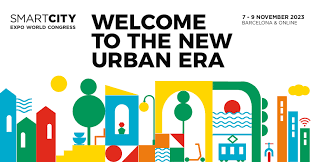My fifth round at World Smart City Expo in Barcelona brought a blend of familiarity and fresh perspectives. Over the past few years I have grown increasingly skeptical of what I often call “stupid” smart-solutions like surveillance systems, sensored waste bins and digital twins which dominate the Expo. I’ve learned that these solutions often lock cities into proprietary systems and substantial investments with uncertain returns. Amidst this skepticism, I found this year’s activities to be a hub of insightful exchanges and reconnection with international peers. Here's a rundown of my top five learnings and insights from the activities I co-organized or engaged in during the event:
- Generative AI Potential: Visiting the Microsoft Pavilion offered a glimpse into the transforming potential of Generative AI. Microsoft showcased a new product enabling organizations to train their own Generative AI models using internal data, potentially revolutionizing how work gets done. Given the impact we’ve already seen from platforms like OpenAI in the past year, and Microsoft's ongoing investment in this field, it's intriguing to ponder its implications for the future of work.
- BIT Habitat Urban Innovation Approach: I was impressed to learn more about Barcelona’s practical urban innovation approach based on Mariana Mazzucato vision. Every year the city defines a number of challenges and co-finance solutions. Examples of challenges tackled through this program include lowering the number of motorbike accidents, and improving the accessibility of public busses in the city. The aim of the approach is not to develop a new solution, but to find ways to co-finance innovation that generates a public return. This governmental push to shape the market resonates as a much-needed move in the smart city landscape where gains are often privatized while losses are socialized.
- EU Mission: Climate Neutrality and Smart Cities: Discussions at the European Commission’s pavilion with representatives from the NetZeroCities consortium highlighted the need for standardized CO2 monitoring in cities. Currently, methodologies vary widely, making comparisons difficult. Practically this means that one ton of CO2 as calculated in one city might translate to zero or two tons of CO2 in another city. While meeting cities at different stages on their climate journey is crucial (ie some cities might only monitor Scope 1 & 2 emissions, while others will also include Scope 3), a key priority for the European Commission and NetZeroCities should be to implement more standardized and robust approaches for measuring and monitoring CO2 emissions, for instance using satellite data.
- Sustainability & Digitalization Dilemmas: Participating in SmartCitiesWorld’s sustainability roundtable revealed several challenges and dilemmas. A key issue raised by participating cities is that sustainable solutions often benefit only certain segments of the population. Think for instance about the subsides for electric vehicles in your city or country – they most likely flow to the wealthiest portion of the population. Moreover, the assumption that digital and green solutions always complement each other is being challenged, as city representatives are starting to understand that digital solutions can contradict and undermine energy efficiency and neutrality goals. Ultimately many of the participants in the roundtable agree on the need to focus much more on low-tech and behavioral solutions instead of always looking to tech innovations which in many cases are neither affordable, nor effective in achieving their stated goals.
- Drum & Bass Bike Rave: Despite the interesting sessions and conversations, it’s an event outside the Expo that emerged as the highlight for me. Two days before the Expo I joined Dom Whiting’s Drum & Bass On The Bike event, with thousands other people taking to the streets of Barcelona on bikes, roller bladders and skateboards. Whiting first started playing music on his bike to counteract loneliness during the Covid-19 pandemic, and since then he has become a global sensation. This was by far the largest and most special critical mass event I have ever participated, and the collective experience was electrifying. To paraphrase H. G. Wells who is thought to have said that “every time I seem an adult on a bicycle, I no longer despair for the future of the human race”, I can similarly say that seeing thousands of people bike and jam through the streets of Barcelona provided me with a glimpse into a hopeful future where community, sustainability and joy intersect.
Overall, I experienced this edition of the Smart City Expo as a melting pot of diverse perspectives and a valuable opportunity to connect with international peers. However, I do have two perennial critiques and recommendations for next year's event. Firstly, the Dutch delegation should finally organize a "Climate Train" as the main transport for its 300+ delegates to and from the Expo. Secondly, I advocate for a shift in the Expo's focus, prioritizing institutional and policy innovations over the current tech-driven approach. This shift would better address the real challenges cities face and the solutions they need, fulfilling the Expo's ambition to be the platform shaping the future of cities as places we aspire to live in.






Thanks for this read! I wasn't there, but it gives me a good/ critical impression. Love the recomendations!